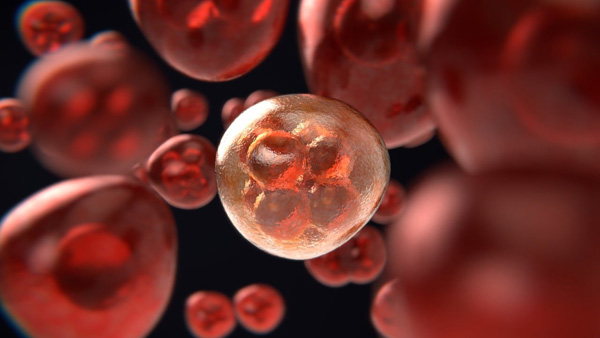Scientists creates human egg cells from ordinary skin cells

[Cells. Photo Credit to Pixabay]
A recent study published in Nature by a team at Oregon Health and Science University has introduced a new technique that can transform an ordinary human skin cell into an egg cell capable of forming an embryo.
This new approach relies on a process based on somatic cell nuclear transfer, the same basic method once used to clone Dolly the sheep.
In this method, scientists first remove the nucleus from a donated human egg, leaving only its surrounding material known as cytoplasm.
They then insert the nucleus of a human skin cell into this “empty” egg.
Since the skin cell nucleus contains a full set of 46 chromosomes, while a real egg has only 23, the researchers had to force it to behave like a natural egg.
To trigger this reduction, they applied an electrical pulse combined with a drug called roscovitine, which altered cell-cycle control and pushed the DNA through a meiosis-like division called “mitomeiosis.”
In some cases, this produced haploid egg-like cells with only 23 chromosomes, called haploid cells, meaning they contained half the normal genetic material.
The scientists then fertilized these artificial eggs with sperm using standard IVF.
A few successfully developed into early embryos, though many showed chromosome errors due to the incomplete mimicry of natural meiosis.
Despite such significant discovery, the method remains highly inefficient and prone to errors.
Out of 82 artificially engineered egg cells, only about 9 percent developed into early embryos called blastocysts.
These embryos often showed abnormal numbers of chromosomes and incomplete reprogramming of the original skin-cell genes.
Genetic sequencing showed that chromosome pairs separated randomly without the usual exchange of genetic material, a flaw that leads to “aneuploidy,” where cells have missing or extra chromosomes.
Before any embryo could be expected to develop to term, scientists will need to precisely control chromosome pairing and recombination, fix genes through chemical modifications, and dramatically reduce developmental errors.
Most experts estimate it could take a decade or more of research and strict safety testing before any clinical use is possible.
Beyond the biological challenges, creating eggs from skin cells raises serious social and ethical questions related to misuse of such power.
One concern is consent.
In theory, anyone’s skin cells, even from something as small as a hair or saliva sample, could be turned into eggs without their permission, raising issues of genetic privacy and potential misuse.
Like other advanced technologies, the cost of such technology could also deepen inequality, as advanced treatments are typically accessible only to wealthy individuals.
Another issue is the possibility of “designer babies,” as the ability to generate many eggs could encourage selection for specific traits, fueling social division and ethical debates.
Legal systems are also unprepared for these scenarios, leaving gaps in rules about ownership, parental rights, and research boundaries in such cases.
As much negative impact this technology may bring to society, the potential benefits are considerable.
The technology could provide hope for women who can no longer produce eggs, to patients who lost fertility after cancer treatment, or even to same-sex couples hoping to have genetically related children.
In laboratories, artificial eggs could help scientists study how human embryos form, reveal the causes of infertility and miscarriages, and provide safer ways to test new drugs or toxins without relying on scarce donated eggs.
As technology advances rapidly, its power to help humanity must be balanced with responsibility and care.
Scientific innovation should always be guided by ethical reflection, ensuring progress serves people rather than endangering them.

- Seungmin Shin / Grade 11
- North London Collegiate School Jeju

![THE HERALD STUDENT REPORTERS [US]](/assets/images/logo_student_us.png)
![THE HERALD STUDENT REPORTERS [Canada]](/assets/images/logo_student_ca.png)
